Loving, Supporting, and Caring for the Cancer Patient
Loving, Supporting, and Caring for the Cancer Patient
A Guide to Communication, Compassion, and Courage
Stan Goldberg
ROWMAN & LITTLEFIELD
Lanham Boulder New York London
Published by Rowman & Littlefield
A wholly owned subsidiary of The Rowman & Littlefield Publishing Group, Inc.
4501 Forbes Boulevard, Suite 200, Lanham, Maryland 20706
www.rowman.com
Unit A, Whitacre Mews, 26-34 Stannary Street, London SE11 4AB
Copyright 2016 by Rowman & Littlefield
All rights reserved . No part of this book may be reproduced in any form or by any electronic or mechanical means, including information storage and retrieval systems, without written permission from the publisher, except by a reviewer who may quote passages in a review.
British Library Cataloguing in Publication Information Available
Library of Congress Cataloging-in-Publication Data
Names: Goldberg, Stan, 1945- author.
Title: Loving, supporting, and caring for the cancer patient : a guide to communication, compassion, and courage / Stan Goldberg.
Description: Lanham : Rowman & Littlefield, 2016. | Includes bibliographical references and index.
Identifiers: LCCN 2016012440 (print) | LCCN 2016023989 (ebook) | ISBN 9781442266155 (cloth : alk. paper) | ISBN 9781442266162 (Electronic)
Subjects: LCSH: CancerPatientsCarePopular works. | CaregiversPopular works.
Classification: LCC RC263 .G62 2016 (print) | LCC RC263 (ebook) | DDC 362.19699/4dc23
LC record available at https://lccn.loc.gov/2016012440
 The paper used in this publication meets the minimum requirements of American National Standard for Information SciencesPermanence of Paper for Printed Library Materials, ANSI/NISO Z39.48-1992.
The paper used in this publication meets the minimum requirements of American National Standard for Information SciencesPermanence of Paper for Printed Library Materials, ANSI/NISO Z39.48-1992.
Printed in the United States of America
This book is dedicated to my beautiful granddaughter Mattea, who I hope with other people of her generation will find this book irrelevant and ask What was cancer, Grandpa?
Acknowledgments
I use loved one as an umbrella term for family and friends and he and she interchangeably to help the writing flow. While all stories are true, names, gender, age, and locations were changed to protect privacy. Quotes are based on my recollections or notes made shortly after an interaction. Thanks to my many clients and patients who invited me into their lives for thirty years and shared their fears and joys. Without your courage this book would not have been possible.
Thanks to Kimberly Cameron, whose commitment and faith in the purpose of this book got it into the hands of Suzanne Staszak-Silva and the Rowman & Littlefield Publishing Group.
The Basics
A t least once in your life, a loved one or friend will say to you, I have cancer, and when you hear these three words, you may struggle with a response. If loved ones or friends havent informed you of a cancer diagnosis, they will. Every year fourteen million people worldwide learn they are living with or may die from this disease, and the number of people living with cancer trends upward as new medical breakthroughs extend life. Almost twenty years ago a good friend informed me of her breast cancer. I wasnt sure what to say, so I uttered the most commonly used phrase whenever someone shares terrible news: Im so sorry. I always wished my response had been more useful. It took years of my serving people with cancer and being the recipient of Im so sorry responses to my cancer before I could become more helpful.
Cancer can attack any organ in the body, pop up at unexpected times and places, steal nutrition from healthy cells, destroy lifelong plans, and create general havoc for those living with the disease and their community. Scientists have accumulated vast amounts of information on the diagnosis and treatment of cancer, but the literature lacks specific suggestions for what to do or say when people reveal their diagnoses. The purpose of this book is to share the knowledge provided to me over the past thirty years by loved ones, friends, clients, and patients. Think of the eighty-three section headings (e.g., Reduce the Chaos of Cancer) as what you should know about cancer or your loved one. But knowing what to do is not the same as knowing how to do it. At the end of each section are suggestions for how to implement the information you just learned. There are 266 suggestions for taking you from compassionate intent to helpful behaviors. In the Appendix all of the whats and hows are listed. Every suggestion comes from research, my experience with cancer, and what my clients and patients have told me helped them. Think of the suggestions as the cumulative knowledge of what cancer patients would like to happen. Not everything in this book applies to everyone. Think of them as cafeteria offerings where you get to choose. Take what you find useful and disregard what doesnt apply. The material contained in this book is not a theory of how people should treat those of us living with cancer. Rather, these are observations of what people living with cancer found to be helpful.
Reduce the Chaos of Cancer
A cancer diagnosis makes life chaotic. The disease acts as if it is an improvisational musician capable of changing direction without notice. Our body, with the help of radiation, surgery, or drugs, defends against the disease as it mutates and grows. Just like the uncertainty a jazz tunes direction will take, cancers development winds through our life in expected and unforeseen ways. There are some things we do know: when the cancer first started showing diagnostic indications, the dates treatment will begin and end, how soon after chemotherapy hair falls out, and the survival statistics for our type of cancer. While the known facts of a cancer journey create anxiety, the intensity of this feeling pales when placed against what we dont know such as, will there be pain? Will drugs be sufficient to stop the pain? Will I live beyond the number of expected years (i.e., five-year survival data)? How will my family and friends react to my disease? Will I lose significant parts of my life even if I survive? Will I be able to cope with or adjust to the changes Im about to experience? These questions and a host of others keep us awake at night.
It would be nice if our path would be similar to a well-laid-out city grid pattern, where the street numbers are sequential or run alphabetically from A to Z. You always know where you are by reading the street signs. If Im crossing Sixth Street, the next street will be Seventh. Unfortunately, our travels are more like a country-road adventure where directions from a local are fuzzy: Go down a ways until you come to the big rock on the left, then the road youre looking for is a piece down the road. Look yonder for the biggest sycamore tree, and take a soft left. Directions such as these lack the comfort of hearing Go down to Forty-Third Street, turn left, and go for two blocks until you come to Madison. Turn right and 785 Madison is on your left. Disappointments, ecstasy, and revelations will fill the country-road journey you are about to take with your loved one. It promises everything found in a spellbinding novel but unlike a book, you cant close it when youve had enough. Expect more chaos than stability on the journey.
Suggestions
Expect a cancer journey to take an uncertain path.
Dont underestimate the psychological effects of uncertainty.
Assume the World of Your Loved One Differs from Yours
In a small restaurant north of San Francisco, I overheard a woman complaining to a friend about the ingratitude of a relative diagnosed with breast cancer. I dont understand it, the woman said. I tried to be helpful. Isnt that what you do for family? I told her of the wonderful new supplements I read about on the Internet; things to control her cancer. She almost bit my head off when I offered suggestions. I mean, these werent off-the-cuff recommendations. Some came from Dr. Oz. They might save her life. Youd think shed be more appreciative. The woman tried to be helpful and probably was compassionate, but she didnt understand her relative entered a different world after receiving a cancer diagnosis. Her agenda of health through better nutrition was something her relative who faced an uncertain prognosis didnt want to hear. Cancer, either stable or progressive, shapes almost all experiences. The presence of a life-altering disease affects people in more ways than cancer-free people may understand. It often becomes evident when a cancer-free person argues with a friend or loved one his interpretation of what they both experienced was not accurate or an overreaction. Its a problem of different perceptions, not honesty.
Next page
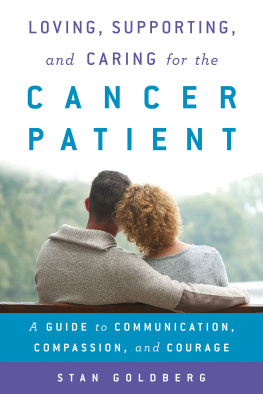
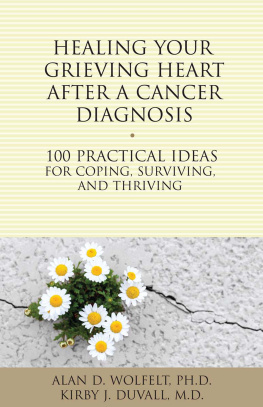

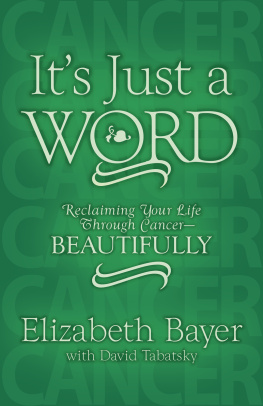
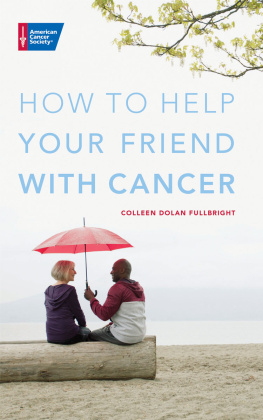
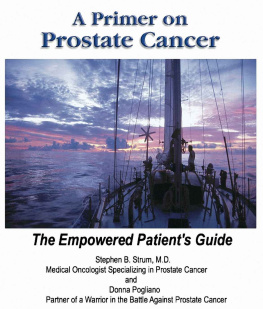
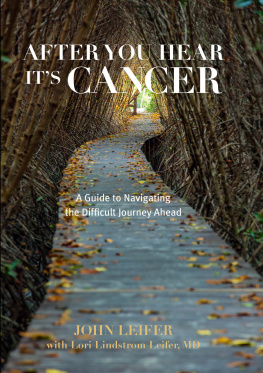
 The paper used in this publication meets the minimum requirements of American National Standard for Information SciencesPermanence of Paper for Printed Library Materials, ANSI/NISO Z39.48-1992.
The paper used in this publication meets the minimum requirements of American National Standard for Information SciencesPermanence of Paper for Printed Library Materials, ANSI/NISO Z39.48-1992.